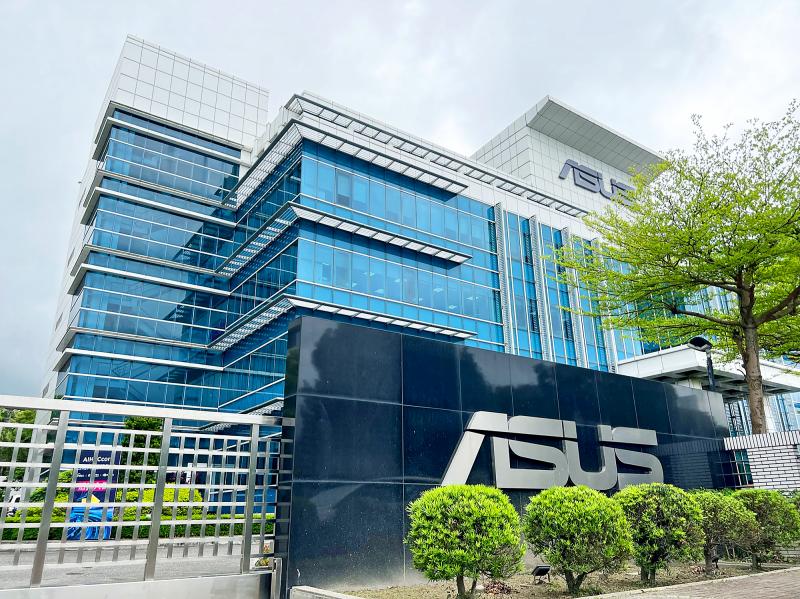Asustek Computer Inc (華碩) yesterday reported a 14 percent sequential decline in net profit to NT$10.43 billion (US$351.1 million) last quarter and forecast that Chinese lockdowns and geopolitical risks in Europe would reduce its PC shipments by 10 percent this quarter.
Shipments of PC-related components, including motherboards and graphics cards, are expected to dip by between 10 and 15 percent sequentially this quarter, the company said.
PCs accounted for 66 percent of Asustek’s total revenue last quarter, while components contributed 33 percent, company data showed.

Photo: CNA
The company, headquartered in Taipei’s Beitou District (北投), also factored in the impact from rising inflation, logistics snarls and flagging consumption prospects.
“The impact of the Russia-Ukraine war is spreading to other countries in Europe due to [rising] energy prices,”Asustek co-CEO Samsun Hu (胡書賓) told an online investors’ conference in Taipei. “In some European countries, electricity bills have surged three times, which is squeezing demand for PCs and other goods. We saw weakening PC momentum in Europe in the past two months.”
COVID-19 restrictions in China, surging inflation and monetary tightening in the US are also dampening demand for PCs, Hu said.
To stimulate demand, Asustek is in discussion with its CPU suppliers and retail partners to launch promotional campaigns, Hu said.
Commenting on key component supply constraints, Hu said chip supply has improved.
With China stubbornly sticking to its “zero COVID-19” policy, shortages of precision electronics and modules have overtaken chips to become the new “gating items,” Hu said.
Asustek said it is cautiously optimistic about the second half of the year, when shipments could pick up due to back-to-school purchases, pandemic-related pent-up demand and the year-end holiday shopping spree.
The company kept its key financial targets for this year unchanged, except for a short-term dip in the current quarter, saying that revenue would increase more than 10 percent annually this year and operating margin would be above 6 percent.
Net profit last quarter fell 14 percent quarter-on-quarter from NT$12.06 billion.
On an annual basis, it expanded 7 percent from NT$979 million.
Earnings per share fell to NT$14 from NT$16.2 in the prior quarter, but rose from NT$13.2 a year earlier.
Operating margin fell to 7.87 percent, compared with 8.69 percent in the previous quarter and 10.69 percent in the same period last year.
To recruit and retain talent, Asustek said it plans to raise employee pay in the first half of the year.
In addition, the company is looking at setting up an employee stock ownership trust this year at the earliest, it said.

Hon Hai Precision Industry Co (鴻海精密) yesterday said that its research institute has launched its first advanced artificial intelligence (AI) large language model (LLM) using traditional Chinese, with technology assistance from Nvidia Corp. Hon Hai, also known as Foxconn Technology Group (富士康科技集團), said the LLM, FoxBrain, is expected to improve its data analysis capabilities for smart manufacturing, and electric vehicle and smart city development. An LLM is a type of AI trained on vast amounts of text data and uses deep learning techniques, particularly neural networks, to process and generate language. They are essential for building and improving AI-powered servers. Nvidia provided assistance

DOMESTIC SUPPLY: The probe comes as Donald Trump has called for the repeal of the US$52.7 billion CHIPS and Science Act, which the US Congress passed in 2022 The Office of the US Trade Representative is to hold a hearing tomorrow into older Chinese-made “legacy” semiconductors that could heap more US tariffs on chips from China that power everyday goods from cars to washing machines to telecoms equipment. The probe, which began during former US president Joe Biden’s tenure in December last year, aims to protect US and other semiconductor producers from China’s massive state-driven buildup of domestic chip supply. A 50 percent US tariff on Chinese semiconductors began on Jan. 1. Legacy chips use older manufacturing processes introduced more than a decade ago and are often far simpler than

STILL HOPEFUL: Delayed payment of NT$5.35 billion from an Indian server client sent its earnings plunging last year, but the firm expects a gradual pickup ahead Asustek Computer Inc (華碩), the world’s No. 5 PC vendor, yesterday reported an 87 percent slump in net profit for last year, dragged by a massive overdue payment from an Indian cloud service provider. The Indian customer has delayed payment totaling NT$5.35 billion (US$162.7 million), Asustek chief financial officer Nick Wu (吳長榮) told an online earnings conference. Asustek shipped servers to India between April and June last year. The customer told Asustek that it is launching multiple fundraising projects and expected to repay the debt in the short term, Wu said. The Indian customer accounted for less than 10 percent to Asustek’s

Gasoline and diesel prices this week are to decrease NT$0.5 and NT$1 per liter respectively as international crude prices continued to fall last week, CPC Corp, Taiwan (CPC, 台灣中油) and Formosa Petrochemical Corp (台塑石化) said yesterday. Effective today, gasoline prices at CPC and Formosa stations are to decrease to NT$29.2, NT$30.7 and NT$32.7 per liter for 92, 95 and 98-octane unleaded gasoline respectively, while premium diesel is to cost NT$27.9 per liter at CPC stations and NT$27.7 at Formosa pumps, the companies said in separate statements. Global crude oil prices dropped last week after the eight OPEC+ members said they would